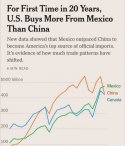Maybe that's why meta had a 20% stock rise. Firing expensive employees and replacing them with H1B guys helps your financials.
Also it's gonna be ironic if the US ends up having a huge real estate crash after spending so much time spewing crap about the Chinese one.
Also it's gonna be ironic if the US ends up having a huge real estate crash after spending so much time spewing crap about the Chinese one.


